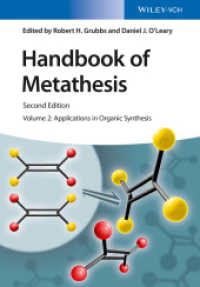- ホーム
- > 洋書
- > 英文書
- > Politics / International Relations
Full Description
In this book, Bruce I. Oppenheimer and the late Robert L. Peabody analyze the 1976 House majority leader race and present the result of their unrivaled insider access to this turning point in congressional history. This fierce contest among the Democratic leadership marked the transition of the House of Representatives into the party-dominated institution that is so familiar today.The 1976 election, in which the Democrats consolidated the gains made in 1974, led to two important changes in House Democratic leadership. After Carl Albert's retirement, Majority Leader Thomas "Tip" O'Neill, Jr., of Massachusetts advanced unopposed to the Speakership. This led to a contest between four formidable candidates for the position of majority leader: Rules Committee Spokesman Richard Bolling of Missouri, Caucus Chairman Phillip Burton of California, Majority Whip John McFall of California, and Representative James C. Wright, Jr., of Texas. It was arguably the most competitive contest for a major leadership position in congressional history. Ultimately, it took extensive campaigning and three ballots before Wright emerged victorious.
During the race, Oppenheimer and Peabody conducted lengthy interviews with the candidates and their principal supporters, resulting in their eye-opening analysis of this contest as a key stepping stone between committee government and conditional party government in the House of Representatives that continues to the present day. The authors first presented their original research on the 1976 House majority leader contest at the 1977 annual meeting of the American Political Science Association. With that original groundbreaking paper at its core, this book adds new chapters by Oppenheimer that evaluate the accuracy of the study and provide richer historical context, showing how congressional politics changed in the years after the 1976 contest. Their original study was the result of the greatest access that political scientists have ever had to a congressional leadership race, and it has enduring value for understanding our current political crisis.
Contents
Preface and Acknowledgments
Introduction
Part I The House Majority Leadership Contest, 1976
1. Abstract and Introduction
2. An Application of Game Theory
3. The Institutionalization of Party Leadership
4. An Overview of the Majority Leadership Candidates, 1976
5. O'Neill's Neutrality
6. Aligning Support
7. The Final Drive for Commitments
8. The Caucus Acts
9. Analysis of the Outcome
10. Some Now and Future Consequences
Part II: Looking Back and Looking Forward
11. Hindsight
12. The House Transitions: The Pathway to Conditional Party Government
13. Aftermath
Notes
Index







